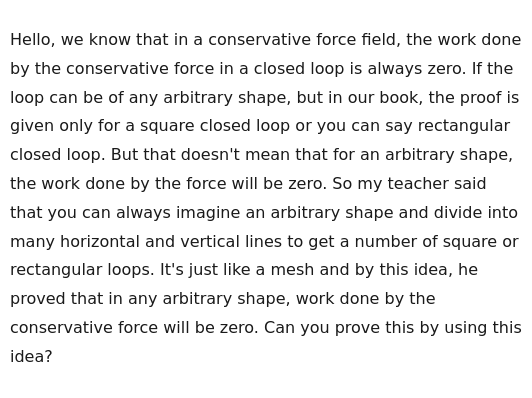Question
Question: Hello, we know that in a conservative force field, the work done by the conservative force in a clos...
Hello, we know that in a conservative force field, the work done by the conservative force in a closed loop is always zero. If the loop can be of any arbitrary shape, but in our book, the proof is given only for a square closed loop or you can say rectangular closed loop. But that doesn't mean that for an arbitrary shape, the work done by the force will be zero. So my teacher said that you can always imagine an arbitrary shape and divide into many horizontal and vertical lines to get a number of square or rectangular loops. It's just like a mesh and by this idea, he proved that in any arbitrary shape, work done by the conservative force will be zero. Can you prove this by using this idea?

The work done by a conservative force in an arbitrary closed loop is zero, which can be proven by dividing the loop into a mesh of small rectangular loops where the work done in each loop cancels out.
Solution
The problem asks us to prove that the work done by a conservative force in an arbitrary closed loop is zero, using the idea of dividing the loop into a mesh of small rectangular loops.
Explanation:
-
Definition of Conservative Force: A force is conservative if the work done by it in moving a particle between two points depends only on the initial and final positions, not on the path taken. A direct consequence of this property is that the work done by a conservative force around any closed rectangular loop is zero. This is the fundamental premise we start with.
-
Decomposition of Arbitrary Loop: Consider an arbitrary closed loop, denoted by C. We can approximate the area enclosed by this loop by dividing it into a large number of infinitesimally small rectangular (or square) loops, forming a fine mesh.
-
Work Done in Individual Rectangular Loops: For each individual small rectangular loop within this mesh, the work done by the conservative force is zero. Let Wi be the work done around the i-th small rectangular loop. So, according to our premise, Wi=0 for all i.
-
Summation and Cancellation: The total work done around the original arbitrary closed loop C (WC) can be considered as the sum of the work done around all the small rectangular loops in the mesh. When we sum the work done for all these small loops, we observe a crucial cancellation:
- Consider any internal path segment that is a common boundary between two adjacent small loops (e.g., a shared vertical or horizontal line segment).
- When calculating the work done for the first loop, this common boundary segment is traversed in one direction (say, from point X to point Y). The work done is WXY.
- When calculating the work done for the adjacent loop, this same common boundary segment is traversed in the opposite direction (from point Y to point X). The work done is WYX.
- Since the force is conservative, the work done depends only on the start and end points. Therefore, WYX=−WXY.
- When we sum the work done for both loops, the contribution from this common boundary segment cancels out: WXY+WYX=WXY−WXY=0.
-
Net Result: This cancellation occurs for every internal path segment within the mesh. The only path segments that do not have a corresponding cancellation are those that form the outermost boundary of the mesh, which collectively constitute the original arbitrary closed loop C. Since the work done around each individual small rectangular loop is zero (Wi=0), and all internal contributions cancel out, the total work done around the arbitrary closed loop C is the sum of zeros, which is zero. Mathematically, if WC is the work done around the arbitrary loop C, and Wi is the work done around each small rectangular loop i, then: WC=∑all small loops iWi=∑all small loops i0=0 This proves that the work done by a conservative force along any arbitrary closed loop is zero.
The core idea is that a conservative force's work along any path segment is the negative of the work along the same segment in the opposite direction. This property, combined with the decomposition of an arbitrary loop into a mesh of rectangular loops, leads to the cancellation of all internal work, leaving only the sum of zeros for the total work done.
